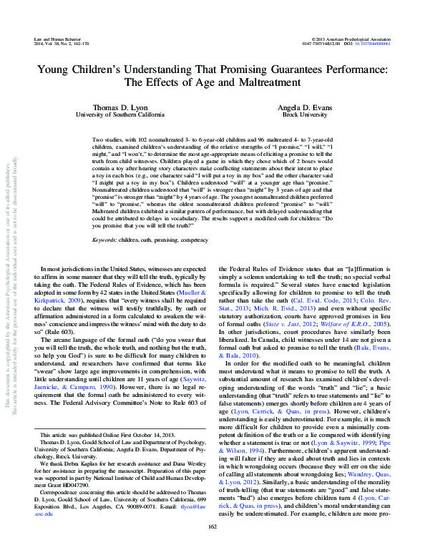
Article
29. Young children’s understanding that promising guarantees performance: The effects of age and maltreatment.
Law & Human Behavior (Published 2014)
(2013)
Abstract
Two studies, with 102 nonmaltreated 3- to 6-year-old children and 96 maltreated 4- to 7-year-old children, examined children’s understanding of the relative strengths of “I promise,” “I will,” “I might,” and “I won’t,” to determine the most age-appropriate means of eliciting a promise to tell the truth from child witnesses. Children played a game in which they chose which of 2 boxes would contain a toy after hearing story characters make conflicting statements about their intent to place a toy in each box (e.g., one character said “I will put a toy in my box” and the other character said “I might put a toy in my box”). Children understood “will” at a younger age than “promise.” Nonmaltreated children understood that “will” is stronger than “might” by 3 years of age and that “promise” is stronger than “might” by 4 years of age. The youngest nonmaltreated children preferred “will” to “promise,” whereas the oldest nonmaltreated children preferred “promise” to “will.” Maltreated children exhibited a similar pattern of performance, but with delayed understanding that could be attributed to delays in vocabulary.
Keywords
- child interviewing,
- child testimony,
- child abuse,
- child maltreatment,
- child witnesses,
- child neglect,
- child psychology
Disciplines
Publication Date
August, 2013
DOI
10.1037/lhb0000061
Citation Information
Lyon, T. D., & Evans, A. D. (2014). Young children’s understanding that promising guarantees performance: The effects of age and maltreatment. Law & Human Behavior, 38,162-170.
